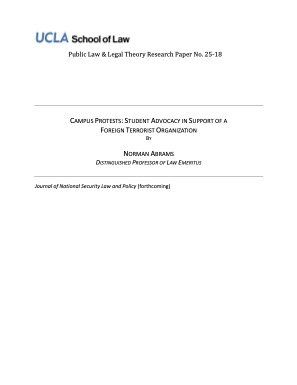By Norman Abrams
During the protests that roiled campuses throughout the United States (2023-2025), many students and student organizations have extolled the Hamas organization and praised its violent attack on Israel on October 7, 2023.
Since 1997, Hamas has been officially designated under U.S. law as a “foreign terrorist organization.” Providing “material support” to a foreign terrorist organization is a serious crime under the federal criminal code.
The fact that Hamas is a designated foreign terrorist organization and occupies a central place in the student protests raises two key questions: Does praise and advocacy in support of a foreign terrorist organization amount to “providing material support” under the relevant federal criminal statutes? Would attaching criminal penalties to such utterances violate the First Amendment?
To date, the federal statutes that criminalize the providing of material-support-to-a-foreign-terrorist-organization have been reviewed by the U.S. Supreme Court only once, in Holder v. Humanitarian Law Project (2010). The main burden of this article is to examine those statutes and the Holder decision and its legal and practical implications for the student protest statements.
In light of the foregoing, recommendations are made: a) whether there is a legal basis and a need for a federal law enforcement investigation, and b) the general form it might take. These recommendations reflect concerns both about the possibility that a foreign terrorist organization is manipulating U.S. campus discourse and maintaining campuses as bastions of free speech, debate and tolerance of diverse opinions.
Keywords: Student protests, demonstrations, encampments, campus free speech, First Amendment, foreign terrorist organization, material support offenses
Journal of National Security Law and Policy (forthcoming), UCLA School of Law, Public Law Research Paper No. 25-18, 31p.


